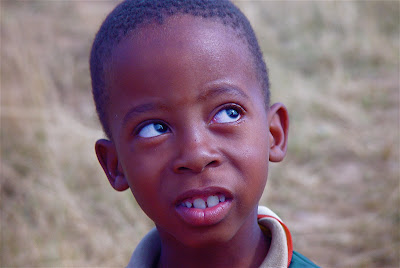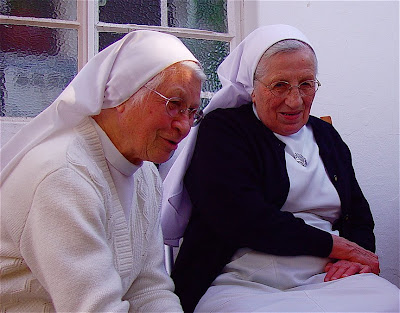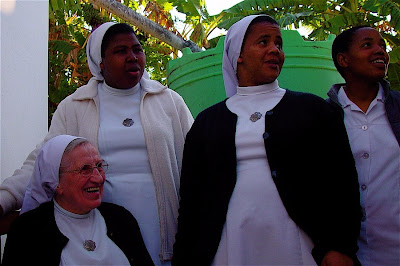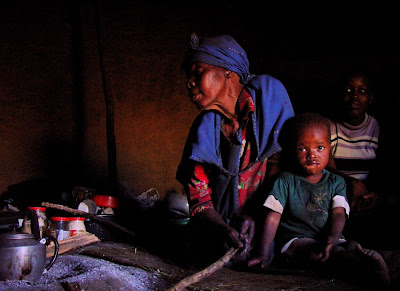Africa began for me on
a Thursday morning in January,
a discouraging day. No one
wanted a woman my age on a new
project. The phone rang
on my cluttered desk. We need
you, she said, come to Africa,
write about our project. I had
never dreamed of Africa like some,
thought it too dangerous, full of war
and disease, not a continent for me.
Come, she said again, we need you.
Without thought I said, yes.

One by One
Some days I cannot see any
hope for Africa, the leaky human
ship of it. When one tiny hole
is patched a fist blow breaks another,
desperate baling by sucking in
one noxious mouthful at a time
and spewing it overboard.
Some days I cannot see any
hope for Africa.
Then I see a face, a smile,
a child who studies hard,
a doctor who returns to help
her village, a principal who
lets his students sleep on
the floor of his modest home
because they live too far,
a nun who’s worked here
half a century still laboring
every day, a young woman who’s
kept her four sisters safe and fed
after both parents died of AIDS.
There is hope for Africa,
one person at a time.


Grave Request
They came to the convent
with a simple request
the two dusty children
walking from the hills.
Money for beer, said
the girl holding her
small brother's hand.
Sister Hedwig wrinkled
her forehead until she
understood. Men
from the village
dig graves for beer.
Their father was dead.

AIDS
Incubus born in steaming
darkness of Central Africa,
the tiniest of enemies saps a
the continent, like a swarm
of billions of mosquitoes
sucking life away.
At rural hospital in the south
it takes twenty in a month,
and no one cares where it
started or why or how, part
of an army of fear, poverty,
ignorance, disease that steals
the breast from newborn babies,
ravages the strong, burns lives
to the ground.
Africa is home
to humankind. Its
pain is our pain.



Zulu Girl Age 10
Afraid is something I can talk
about, she said, her eyes wide
in the dark of her young face.
I was afraid my mother would die
because she took care of us and she
was my mother. She died in spring.
I was afraid my father would die
and it would be only me and my little
brother. He died the next winter.
Now I am afraid when I hear animals
at night. There's a leopard here.
I'm afraid when I hear men's
voices drunk outside, even baby girls
are not safe here. I use different
voices and rattle things to make
them think we are not alone.
I am afraid when I have no candles
left, night comes so soon. I am afraid
when our meal is running out,
I know I will have to teach my little brother
to steal. I am afraid I cannot get
to the school when it rains, and
then there is no hope. Afraid
is something I can talk about.

Eye of the Hippo
It’s in the eye,
when you see it
just above
the surface
unblinking,
noiseless,
watching
the knowing
brown orb
following
as I move
past in my
flimsy boat.
It’s in the eye.


Little Girls at a Wedding
The two girls stood impatient
in front of the church
in crisp white dresses
their eyes, their hair
gleaming in the sun
as their elders gathered
in a patchwork of colors
bright and dark, rundown
sandals, bags that didn't
match and didn't matter,
women of traditional build
solid wearing their space
with assurance. The girls
with skinny black legs
and waving spider arms
wheeled and danced
unaware that they needed
any space at all.

Harsh Times
Amahle lay on the garbage
heap behind the house, weak not speaking
her dwarf limbs limp. Her mother
dead like so many, and this child
was a curse. She’d never
be like other kids, better not waste
food on her. Let the strong survive.



Food Glorious Food
Children dance to celebrate
school lunch, rice and ground meat stew
cooked over a fire by a village woman,
every plate emptied clean. They dance
rhythm on bare cement floors,
school uniforms askew, mended desks
pushed aside, windows metal framed
with lumpy paint pushed open,
naked rafters clean with song.
Every day a meal with meat,
a luxury, provided by a village
in another world where children
throw food away.


At the Hospital Gate
It’s a sign, definitely
a sign, rasped the old
man, leaning against the
stone wall topped with
razor wire surrounding
the town hospital. The
door of the metal shipping
case serving as a store
swung open for the day
one of the rusted hinges
snapped. It’s a sign, he
cried, we’ll need more
coffins than the shop will
hold so the door fell off.
Go away, old man, said
the shop keeper, propping
up the metal door and setting
out his sign: Coffins Here,
New and Unused.


Girl on a Red Road
Looking at her the first time
you might not even see it,
nested in her thick hair, a shiny
charm on a plastic barrette
her clothes limp unmatched
worn, feet dusty bare, walking
for water on a red African road.
If you saw her every day
perhaps you would finally
see it, catching a ray of sun
by the plastic water bottle
balanced on her head
and on another day you
might ask and she would
smile as wide as the river
and say, my daddy, he loves
me. And you might know
and maybe she does too that
he'll never be back, but you
smile too and agree,
surely he loves you.

Morning Silence
In a land of noises
Busisiwe wakes to silence
the air in the round hut
still, she pulls open her eyelids
heavy as full buckets of water
this morning after another night
of sounds creeping in the brush
danger always present
slicing through the tall grass
to the uncertain rhythm
of Umama’s ragged breath.
A crow calls, and another,
in the silence that fills Busisiwe’s
throat, her chest, her empty
stomach. A woman at twelve
she must care for her small
brother and tiny sister,
a bath today and fix brother’s
sandal so she doesn’t
have to walk alone for water.
And Umama, she must care for Umama.
But the silence. Brother whimpers
and stirs, at six he can build
a fire outside the doorway
to warm the stones to keep
Mma warm. Even on warm
days she’s cold now, even with
the children’s clothes piled on top.
There’s only one cupful of meal
left to last four days, and baby sister’s
always hungry, not old enough
to be used to emptiness like
Busisiwe. She’ll have to
use it carefully. She tries not
to hear the silence.
Brother sits straight up
eyes wide in his dream
darkened face. It’s the silence.
Busisiwe moves to hold him, they
stare at Umama, so silent
so still now. Baby sister crawls over
and they cry to drown the silence.


King of the Grass
Green or gold with mighty legs
brilliant eyes and cutting jaws,
filling the night with pulsing song,
kings in your leafy realm.
You come in clouds and cover
the sidewalks. You own this land.
Until some cosmic kitten spies you sitting
in the grass and makes a snack of you
on a sunny afternoon.


News from an AIDS Hospice
The six stood without habits in
long night dresses helpless
with garden hoses, ashed faces
flickering crimson. Five saved, can
we save one more. Two ran back
into the inferno, one emerged
blackened as century-old
thatch collapsed. The hospice
patient who had to smoke died on
his flaming mattress and two more
who had come there to die,
but not like this. Sister Anne
had come to give her life to God,
but like the others, not like this.
All they found the next day smoking
ashes was her blackened skull.



And Angels Sang
My thoughts fulfill every stereotype,
but still it seems like magic. Their voices
are like a mythical choir of angles,
like going to Mass with the Mormon Choir,
like they’ve trained for this many months
clear, sweet, warm as the morning sun,
cool as a summer evening, from the most
ragged, the most humble to the strong and
the stout, their voices are like magic. I wish
I didn’t know the man next to me has TB
that’s spraying all over me every time he coughs.

The Animal Park
Water buffalo standing
so close in the tall blond grass
chewing peacefully like
any old cow. I wish I didn’t
know you are only here
separate from the herd here
because you have TB and
the sick separate themselves
to die.
Wild elephants moving slowly
making mud with pillar legs
reaching out to touch each
other with your amazing trunks
big as fire hoses. I wish I did
not know men seek
to slaughter you for your tusks
and leave your flesh to rot.
Stately giraffes, with individual
jigsaw patterns, moving on impossible
legs like living dinosaurs, a rhythm
all your own, with zebras like
black and white cartoons running
with you, not even reaching
your bellies. I wish I didn’t know
that lions wait to kill your
babies in a moment unguarded,
as it has always been.
Antilope, gisselle, arching
across the hill in pink dawn light
as we sit on our grass-roofed porch
sipping coffee and eating toast.
I wish I didn’t know one of
you was on our buffet last night.
I wish I didn’t know
that all of you are only here
because there are severe
punishments for killing
you in this protected
reserve, that you have to
be in a national park to exist,
that people are hungry enough
to try to sneak in to feed
their children.


Children's Center
Sweet Thabisa, Longo,
Mbale, dark cherub faces
shrieking with joy with
your friends in the play yard.
I wish I didn’t know what lurks
in your blood and that you will
grow up in this orphanage because
no one wants a child with HIV.


Voices: South Africa
1.
There is hope here
again. The road has potholes
but we are headed in
a better direction. There
is hope here now.
2.
I don’t even want to hear
about AIDS any more. They
are irresponsible, lack of control
has gone to their heads. The answer
is simple: Keep it zipped.
3.
The problems here are
overwhelming. You think
you’ve made a chink and
a dozen more unsolveables
spew in your face. This
whole bloody continent
will just sink.
4.
God works in ways we cannot
understand. God asks for patience
but He never stops moving forward.
I do what I can, one person at a time.
That is all I can do. God works.
5.
This is our country, our land,
the white devils should go back
where they came from or sink
into the sea. This is our land.
6.
The worst thing a Zulu son
or daughter can do is bring home
and Indian fiancé. They are wealthy
and successful, but they have
strange gods and they do not
belong here.
7.
I would not want to be in a university
class with someone from that tribe. They
are stupid, they can’t speak right. They
shouldn’t be in government. People of my tribe are
strongest, smartest, we should be in charge.
8.
We stayed in our houses that night
the election night, feared a tidal wave
of blood and anger. Instead the streets
were filled with celebration, aparthied
banished. Still there is fear.
9.
The ancestors are here
around my house every day
jealous as they were in life
spiteful sometimes, knocking
over a pot just to remind me
they are still here and hungry
now. But I have no money
to feed my grandchildren
either. So they wait and do
mischief.
10.
They say I have AIDS, I need
to be tested, to take their medicine,
that I can live. But I know why I
am sick. I did not sacrifice a cow
last summer when my wife died
and the Ancestors are angry.
11.
I cry at the poverty in the
wild country here. The shadow
of AIDS, lack of education,
the anger, the pain. But I
don’t know what I can do.
I hire them and pay them
but there are so many out there.
I have my life my family
to think about too.
12.
Our people need education. It is
the only way up, out of the oppression
designed to crush the strength
of our culture. Our people need
to be the doctors, the lawyers,
the university professors. Our people
are willing to work hard to
push open this crack of opportunity.
Our people need education.
13.
No one wants to plant a garden
to work in the dirt, even to grow
food. That work is for poor people,
ignorant people, people who aren’t
free. I will not work in the dirt.
I am better than that.
14.
I want to be a doctor or a teacher
or a psychologist. I will pass my exams
next year and I will leave here.
A good life is there for me
if I reach just a little farther.
I will pass my exams next year
and I will leave this village behind.
15.
Listen and you will hear it there just now
that sound, like the wind coming
across the hills, moving the leaves,
even lifting the hair on the lion’s
mane, rattling the windows of the
strongest house. You can hide from
it, stand under the rocks there or
sit low in your castle, but you cannot
stop it. No one can stop the wind.


Veritas
There is no truth, she said,
in what you think you see
in the dark eyes of a starving
village. You, from the land
of the possible with shelves
filled with food, streets safe
at night, schools for everyone,
a place where Death only visits.
You think anything's possible.
You can never in a lifetime
know the truth for my people.

One at a Time
What resolution can there be
for troubles so old and so new,
so simple and so complex
so large and yet so small.
One child, one family, one
father, one mother, one school
one village at a time.
No tsunami of rescue, no flood
of change, no cyclone to
sweep away poverty. One book,
one hug, one shower of hope
pushing toward tomorrow
a better world for us all.
